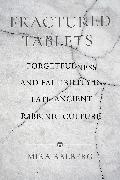Description
Product details
| Authors | Mira Balberg |
| Publisher | University Of California Press |
| Languages | English |
| Product format | Paperback / Softback |
| Released | 31.03.2023 |
| EAN | 9780520391864 |
| ISBN | 978-0-520-39186-4 |
| No. of pages | 300 |
| Subjects |
Humanities, art, music
> History
> Antiquity
RELIGION / Judaism / General, HISTORY / Ancient / General, HISTORY / Social History, Social & cultural history, HISTORY / Jewish, RELIGION / Judaism / History, RELIGION / Judaism / Talmud, RELIGION / Ancient, RELIGION / Judaism / Sacred Writings, History of Religion, Judaism, Ancient World, Social and cultural history, Ancient History, Ancient history: to c 500 CE, Relating to Jewish people and groups, Ancient religions & mythologies, Ancient religions and Mythologies, Judaism: sacred texts and revered writings, Judaism: Sacred Texts, Rabbinic literature |
Customer reviews
No reviews have been written for this item yet. Write the first review and be helpful to other users when they decide on a purchase.
Write a review
Thumbs up or thumbs down? Write your own review.

